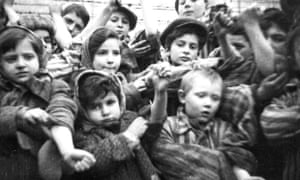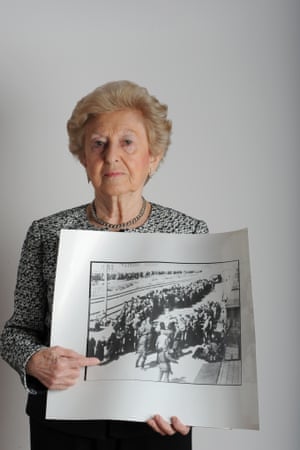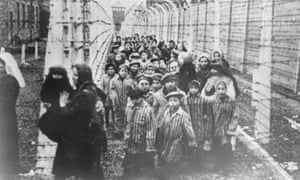- + New Story
- Support Us About More
frame
Howdy, Stranger!
It looks like you're new here. If you want to get involved, click one of these buttons!
Events
- 59.1K All Events
- 0 Rwandan Genocide
- 0 Cambodian Genicide
- 1 Cold War
- 14.8K Holocaust
- 0 9/11
- 0 Immigration
- 0 Native American
- 0 British America
- 0 Colonial America
- 0 American Revolution
- 0 Pearl Harbor
- 1 Korean War
- 0 Vietnam War
- 1 Russian Revolution
- 0 Civil Rights Movement
- 0 World War Two
- 14.9K World War One
- 14.6K U.S. Civil War
- 14.8K Armenian Genocide
- 2 General
The Holocaust Story of Irene Fogel Weiss
- Date of Birth
- 1930
- Name
- Irene Fogel Weiss
- Your Relationship
- Other
We lived in Bótrágy, a very small, mostly poor town in Czechoslovakia with a population of approximately 1,000 mainly farming families, including about 10 Jewish families. The town was a typical low-income community with a tailor, a shoemaker, a grocery store, where people struggled to get by, but where everyone knew each other and there was easy communication between the neighbours, though that didn’t mean we were equal.
When I was eight years old Czechoslovakia broke apart and we became part of Hungary. That was when our problems started, because the Hungarians were allied with the Nazis. It was a difficult time for Jewish families, as suddenly the law no longer protected us and overnight we lost our civil rights. My father’s lumber business was confiscated and given to a non-Jew, and we received no compensation. Jewish children were thrown out of Hungarian schools, so right away we had no choice but to concentrate on hunkering down and trying not to bring attention to ourselves. We couldn’t ride the trains and we had to wear the yellow star. It was a free for all. With no law to protect us, it was common for Jews to get beaten up or thrown off the train.
It’s an incredibly scary feeling when you’re exposed to anyone’s raw feelings and enmity. These young Nazis habitually roamed around and did tremendous damage to many individuals. But at least we were still in our community and were not evicted from our home, so that was some comfort.
We didn’t have radio or much access to newspapers, so all the children were reliant on listening to their parents for information. But I remember many things about the course of the war, who was winning and losing, and the repression of Jews elsewhere.
Hungary didn’t give up its Jewish population until it was invaded by Nazi Germany in 1944. The very first task the German government gave the Hungarians was to round up Jewish families and deport them to Auschwitz. There was a huge rush to take half a million Hungarian Jews to Auschwitz and it was completed in just six weeks, in 147 cattle cars. So in the spring of 1944 my family – my parents and their six children, the oldest of whom was 17 and I was 13 – found ourselves in the Munkács ghetto and from there being taken on cattle carts to Auschwitz in Nazi-occupied Poland.
Imagine it like this: three generations of your family have lived in the same house in the same town. They’ve struggled to raise a family, put kids through school, to feed them all. You have your friends and family. All of a sudden you are told to leave it all and walk out with a single suitcase.
I remember the night of the packing very well. Things went in the suitcase, things were taken out of the suitcase. In the end my mother filled it with food she had cooked and warm clothing and bedding. Then it was full. Plus we took a watch, some earrings, a wedding ring with us to exchange for food if necessary. The next day my father was forced to hand over his remaining money to a delegation that included the mayor and the school principal as they rounded us up at the town hall.
We had been absolutely unaware of such a place as Auschwitz. It was a stunning reversal of the life we had had up until then. And I cannot emphasise enough how utterly scary it is to be at the mercy of your fellow human beings. As a child I could not understand what we had done to deserve going there.
My father surveyed the scene from the train and could see prisoners, uniforms and barracks so we immediately thought it was a work camp, and that was reassuring – if we can work, it can’t be such a dreadful place. We had heard about the stories in Poland of lots of mass shootings of Jews or people being taken into the forest and shot, so it was a relief to see out the window that there was actually a system. Even though we were victims of discrimination at that stage that’s all it was, as we had no clue then that this was a very carefully orchestrated plan of genocide. We could not have imagined that they would kill little children, until we realised that killing children was their primary goal to prevent any new generations. Because desperate people will always look to find some sign of hope, we thought to ourselves even if we have to work, at least we’ll see each other occasionally.
But the German system was full of this sort of deception. It counted on people’s normal perception of things. Thinking we were going to a work camp. Thinking that you were going to take a shower when in fact you were going to the gas chambers – that was the ultimate deceit.
All of a sudden you are told to leave it all and walk out with a single suitcase
Irene Fogel Weiss
When we arrived it was, as I later found out, the usual story, though not to us at the time. Our family was torn apart on the platform on arriving. My sister, Serena, was chosen for slave labour. My mother and the younger children were sent off to one side and my father and 16-year-old brother to the other side. I held tightly on to the hand of my 12-year-old sister and for an instant I was mistaken for being older than I was, probably because I was wearing a headscarf that my mother had given me.
My sister was sent with my mother, while I went to the opposite side. That was the first chance I had to survive. Unbeknown to any of us at the time, two Nazi soldiers had been asked to make a photographic document of the deportation of Hungarian Jews from the moment they got off the train – through the entire system of arriving, going to the bath house and getting their prison clothes – so I ended up in a picture at the very moment I was separated from my sister. It captures me standing alone without my family on the Auschwitz platform, and I’m leaning inwards to see where my little sister has gone.
Another picture we discovered shows my family waiting in line for the gas chamber. Two little boys, my brothers Reuven and Gershon, are shown dressed in hats, one struggling to put on his winter coat. For a long time I failed to find my mother and was very unhappy. But I spent hours looking at these photos with a magnifying glass and one day I found her little face sticking out.
The pictures only came to light 25 years ago and, despite them showing moments from around 45 years before that, they completely captured the entire experience as it had been in my mind all that time. I was dumbfounded and devastated, having had no idea they existed, and I have spent literally hundreds of hours scouring them, trying to find my father and brother. The pictures have reassured me that I was not imagining it all, as I sometimes thought I might have done.
The reality of where we were, struck home fairly quickly. I was stationed near crematorium number four, and we witnessed the columns of unsuspecting women and children entering the gate of the crematorium; they would have been dead within half an hour. When the Hungarian Jews arrived they had the gas chambers going day and night. How can you wrap your imagination round that? I still can’t.
I was with my older sister Serena and we were sent to be forced labourers together in the Birkenau section of Auschwitz. Many times we were threatened with separation but somehow we managed to stay together. Later on, to our great relief we ran into my mother’s two younger sisters, our aunts Rose and Piri, who were in their early 20s. It was like finding our parents. They were such a huge moral and emotional support for us.
On about 17 January or 18 January 1945, the SS dragged thousands of us out of the camp to walk to Ravensbrück concentration camp deep into central Germany. I don’t really know why. We were in terrible straits with no proper clothes, nothing suitable for marching through the snow. It was as if the cruelty would never end. If anyone sat down out of exhaustion, they were shot. Later we were transported yet again, and my aunt Piri became ill and was killed.
As the Soviets approached, the SS left and I, Serena and Rose took shelter in an empty house nearby. The Russians came but for some reason left again immediately, so we were left to fend for ourselves.
We spent months trying to get to Prague where we knew we had some relatives and from there we went to the Sudetenland. I got to go to school, my sister found work in a factory and Rose was sick at home with tuberculosis.

We initially had no idea what had happened to the rest of the family and had no access to a phone. But on buildings everywhere lists were put up stating who was still alive. Everyone you met you asked, every meeting of refugees was dominated by trying to find out where your relatives were.
Eventually I discovered that of around 100 people from my town who were deported, only about 10 survived, only two of whom were children – my sister and me. But there was not one parent and child who lived. All of them were killed.
This is my last chance to make sure this tragedy is not forgotten
Irene Fogel Weiss
Serena now lives in New Jersey with her family, including three children and grandchildren. We’ve both managed to hang on in there, but she can’t come to Auschwitz because her elderly husband is sick. For years when we talked about our experience she’d say to me: “You probably don’t remember, you were too young,” as I was four years younger, but some things I remembered even more sharply than her and my aunt.
I’m often asked how I have coped. I never went to a psychologist and I never will. Quite simply, I kept it at a distance. I saw and understood, and yet I didn’t. I’ve never cried over the columns of children and mothers I saw. When I was in Auschwitz I thought: ‘This is not actually on earth.’ It was a system of masters and slaves, gods and subhumans and I thought to myself: ‘No one knows about it. It’s the forest, surrounded by multiple layers of fence, it’s not actually real.’ I never let it penetrate that my parents were killed and I even thought: ‘After this we’re going home and everyone will be there again.’ Those who never managed to keep it distant killed themselves.
I threw myself into family life. I married young, I had three children, (I now also have four grandchildren) and then I went to college and became a teacher. You fall into a routine and do the best you can. But I’ve never lost the feeling of how unreliable human beings are and neither am I fooled by superficial civilisation. But I realise that loss of faith in people is more devastating than loss of faith in God.
I won’t be going back to Auschwitz again after this visit. So it’s my last chance to make sure this tragedy is not forgotten. I found out only about a week before I was due to leave that I will be one of two survivors who will be part of the US presidential delegation, headed by the secretary of the treasury, Jack Lew, and I feel very honoured, but it has much to do with the fact that many others who could go are ill and unable to travel.
Published in The Guardian (https://www.theguardian.com/world/2015/jan/26/tales-from-auschwitz-survivor-stories) and written by Kate Connolly.

